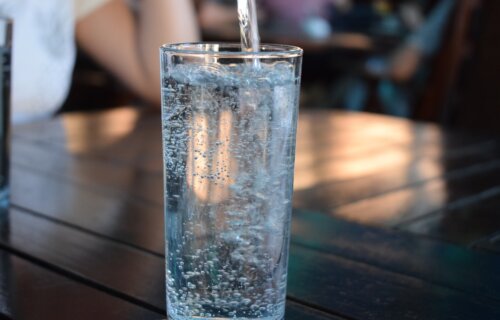IRVINE, Calif. — Alkaline water may not the be kidney stone panacea many have made it out to be in recent years, according to a new study. Researchers at the University of California-Irvine find that bottled water marketed as “alkaline” is very unlikely to effectively prevent recurring kidney stones.
Alkaline water, also known as high pH water, has become an increasingly popular category of bottled water. In comparison to traditional to tap water, which features a typical pH around 7.5, alkaline water is specifically manufactured to boast a higher (more alkaline) pH – in the range of eight to 10.
“While alkaline water products have a higher pH than regular water, they have a negligible alkali content – which suggests that they can’t raise urine pH enough to affect the development of kidney and other urinary stones,” comments senior author Roshan M. Patel, MD, of University of California, Irvine, in a media release.
Alkaline water enthusiasts claim its higher hydrogen count offers numerous health benefits such as improved hydration and increased urinary pH. Additionally, increasing pH has been a key strategy to prevent the formation of certain types of urinary stones (uric acid or cystine) in patients who have had stones for some time now.
Potassium citrate tablets are the most commonly prescribed treatment to prevent recurrent stones. However, many patients do not follow this recommended treatment, usually due to the unpleasant need to ingest large pills several times daily. If alkaline water indeed raises urinary pH, it may be an attractive alternative for stone prevention.

To analyze the potential for high pH water to prevent urinary stones, Dr. Patel’s team measured the pH levels of five commercially available alkaline water products. Next, they reviewed published data pertaining to other varieties of drinks and over-the-counter products with the possible capacity to raise urinary pH.
The five assessed brands all displayed a similar pH, in a narrow range around 10. One of the brands contained a small amount of citrate, which was not on the product label. Besides that, the alkaline waters tested did not contain organic anions that the body can metabolize into alkali — which is what potassium citrate tablets supply to the body.
At a pH of 10, the products would have an alkali content of just 0.1 milliequivalent per liter (mEq/L). According to the research team, that would be a “trivial” concentration in comparison to the body’s typical metabolic acid production of 40 to 100 mEq/L per day.
Conversely, certain commercially available products do have the potential to increase pH, perhaps most notably orange juice, which has an alkali content of up to 15 mEq/L. Additionally, OJ also has the lowest estimated cost to reach target alkali concentrations of 30 mEq per day.
Baking soda ranked among the most effective and cost-efficient alternatives, although it should be noted that baking soda carries other potential concerns related to sodium content. Newer products dissolvable in water also appear capable of providing useful and affordable options.
“Our findings may help to guide the selection of other treatments, including beverages and over-the-counter products, for preventing recurrent urinary stones,” Dr. Patel adds.
In conclusion, study authors point to the limitations of their laboratory study and emphasize the need for further clinical trials focusing on the options for raising urinary pH.
The study is published in The Journal of Urology.
You might also be interested in:
- Is alkaline water a medical marvel or just a marketing ploy?
- Drinking water but still feel dehydrated? This might be why
- Added sugar in food and drinks may lead to painful kidney stones
